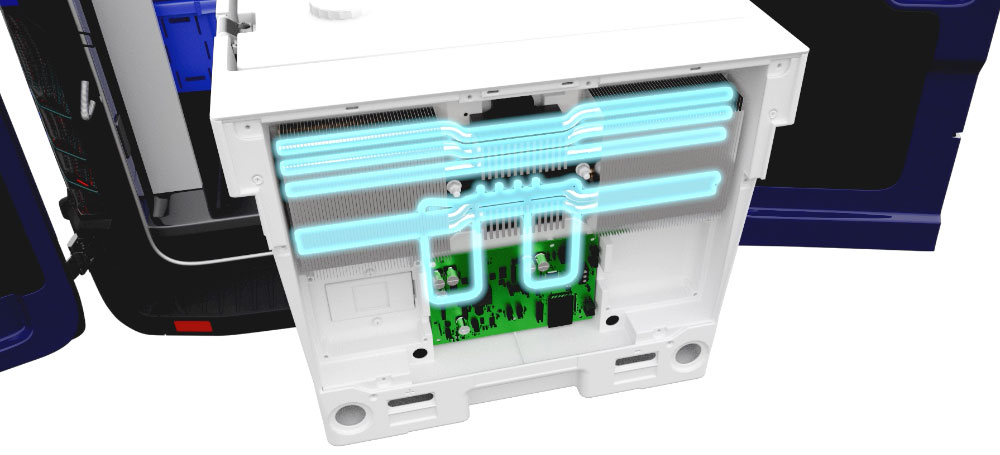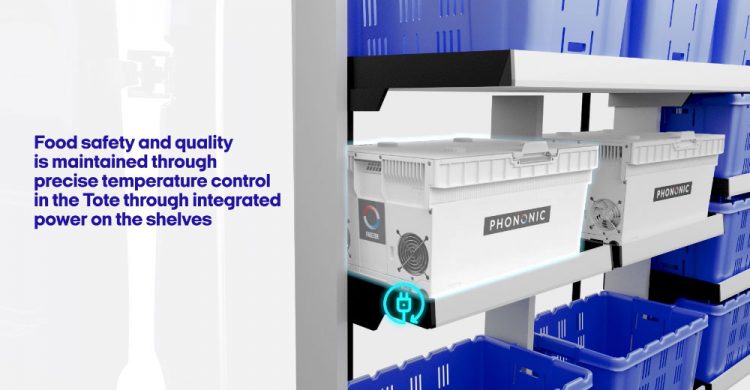Last mile delivery of products ordered online is a nagging problem for merchants and consumers, and it is even more challenging for food retailers.
The innovative Phononic EV might be driving a new solution to deliver groceries efficiently and sustainably while rivaling Amazon’s planned aerial drone package delivery system.
Phononic unveiled its electronic vehicle for sustainable last mile delivery at the Home Delivery World Show in Philadelphia on Aug. 31. At this point, the vehicle is a functional proof of concept. It is not available on the market.
What happens next is in the hands of Sortimo. The two companies formed a partnership to fit the Ford E-Transit (Extended Version) with reconfigurable shelving to create a cold chain transport van for grocery retailers to deliver on e-commerce without the food spoilage risk.
Phononic’s new approach integrates thermoelectric-based cooling solutions into customized shelving. The partnership created the first truly sustainable cold chain grocery transport by transforming an electric van into an all-electric tri-temperature vehicle.
The electric vehicle is free of the environmentally damaging, synthetically produced refrigerant called hydrofluorocarbon or HFC.
“We could see the ability for customer deliveries using EV vans upfitted with Phononic technology for tri-temperature cooling likely in 2023,” Dana Krug, vice president and general manager at Phononic, told TechNewsWorld.
A Peak Inside
Phononic’s first electric vehicle is fitted with the company’s Actively Cooled Tote. Sortimo’s customized FR5 and SR5 van shelving are built-in to create an optimal and efficient way to store chilled, frozen, and general merchandise orders all in one vehicle during grocery delivery.
With the SR5, the shelves can be configured to fit any space to optimize payload and cargo capacity. As online ordering becomes consumers’ preferred option, all-electric technology can help grocers sustainably enhance their last-mile delivery fleet.
Image Credit: Phononic
According to Krug, this offers access to same-day deliveries while driving a strong ROI with enhanced customer loyalty and increased levels of sustainability. Its technology is inherently a great mobile platform.
The delivery van uses proprietary solid-state cooling technology instead of existing compressor-based mechanical systems that can fail. Its system’s compact heat pump allows for more capacity in the same space. The controls reduce energy requirements.
Demand Heating Up
Market studies show that the demand for online food purchases is rapidly growing. Online grocery ordering and delivery are here to stay, making execution in the last mile even more critical.
“Maintaining the perfect temperature for a range of food — frozen, chilled, and ambient — is forcing grocery retailers to rethink their entire operations,” Krug observed.
“As online ordering becomes the preferred option for consumers, all-electric technology can help grocers enhance their last mile delivery fleet in a much more sustainable way, offering access to same-day deliveries while driving a strong ROI with enhanced customer loyalty and increased levels of sustainability,” he added.
As demand for grocery delivery increases, the need for more vehicles to make those deliveries will increase. Industry reports predict that by 2030 the number of delivery vehicles on the road will increase by 36%.
“We give retailers the option to use electric vehicles that can be upfitted with our solid-state cooling technology. This lowers total Global Warming Potential (GWP) instead of adding to the problem with combustion-based vehicles fitted with compressor-based high GWP refrigerants,” he noted.
The current process of grocery delivery is not sustainable for longevity if retailers want to remain relevant and competitive, added Krug. Today’s grocery delivery needs demand a new approach that is sustainable and cost-effective.
Expect Phononic Fleets
The goal is to develop innovative mobility solutions that help solve issues plaguing the environment, noted Erik Nelson, director of sales fleet mobility solutions at Sortimo.
“Working alongside Phononic to upfit this one-of-a-kind, environmentally-friendly, all-electric vehicle allows us to be a part of designing the first wave of truly sustainable grocery delivery,” he offered.
Phononic is still testing the van to understand the impact on the range of the vehicle. But Krug expects the effect to be low.
The tri-temperature EV was designed to increase the route density of deliveries for retailers. Its unique design allows retailers to add general merchandise and temperature-controlled items in addition to groceries to make route optimize deliveries for fewer total delivery miles.
Phononic does not plan to sell the actual van, Krug noted. By partnering with Sortimo, his company sees an opportunity to refit not just a Ford E-Transit but other vans.
How It Works
The potential solution is Phononic’s cooling technology, which uses just water mixed with naturally available CO2, Krug explained. Solid-state technology, portable freezing, and refrigeration are now a reality, and the combination keeps anything precisely cold anywhere.
Truly portable freezing and refrigeration have never been possible because of environmental challenges such as shock and vibration, weight, size, and power availability. Its DC-powered refrigeration is controlled by solid-state technology and can enable battery-powered refrigeration.
This method offers consistent, reliable cooling over an extended amount of time. That reality gives food merchants the confidence that the contents will be safely kept at the required temperature.

Phononic’s cooling technology uses only CO2 and water as refrigerant, eliminating environmentally destructive HFCs. (Image Credit: Phononic)
The system is monitored via Wi-Fi or cellular data to verify cold chain compliance. Solid-state cooling can respond to remote commands for complete temperature control anywhere, anytime.
A key benefit is the ability to lower the temperature of specific compartments inside an entire cargo container or vehicle as needed. This optimizes energy usage while keeping the rest of the space at a standard temperature.
Thermoelectric technology has been around for over a century. Until now, what was missing was integrating the engineering disciplines of pumping, moving, and controlling heat to create a new thermoelectric system that is powerful, flexible, and efficient, according to Phononic.
About Vehicle Adaptation
Phononic started its EV delivery van project in June 2021. This vehicle is a fully functional test model but can be adapted for other vans that need last cold chain delivery.
Sortimo’s FR5 shelves fold and are designed specifically for couriers, express delivery, and parcel services. SR5 shelves offer flexibility to develop the vehicle’s interior in any configuration that benefits the delivery operation. Combined, the shelving options allow for transporting chilled, frozen, and general merchandise orders in one vehicle.
Ford’s E-Transit offers up to 487.3 cubic feet of cargo space inside the high roof. It has an extended wheelbase configuration and a range of approximately 126 miles on a single charge.
The market has seen clear benefits for EV vehicles over combustion-based vehicles in delivery solutions. This is one of the reasons you have seen announcements from major retailers with multiple EV companies for thousands of EV vans to be used for grocery delivery, Krug reasoned.
“Adding tri-temperature cooling solutions from Phononic provides retailers with a cold chain solution that eliminates the need for dry ice or other passive cooling options, as well as high GWP figurants used in compressor tri-temp delivery vans,” he said.
Source by www.technewsworld.com





























